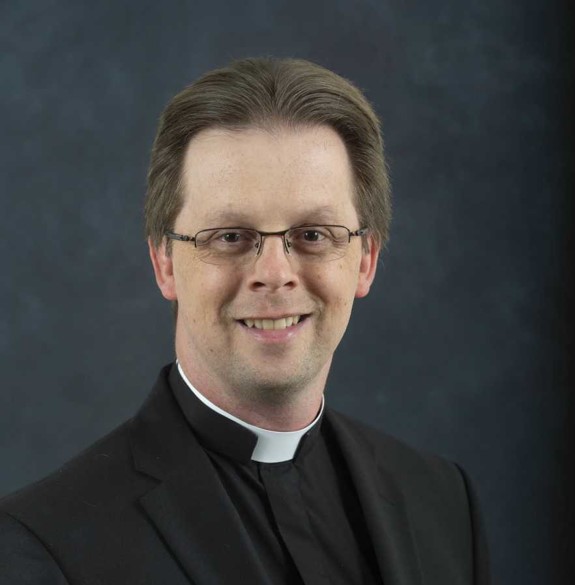May 18, 2025
Brothers & Sisters in Christ,
The mysterious book at the end of the New Testament may seem a bit intimidating to most. It is full of symbolic imagery that requires substantial interpretation. That said, I thought it might be helpful today for us to do a little reflection on the Book of Revelation and on the New Jerusalem.
First of all, the Book of Revelation is an example of apocalyptic literature. Some bibles still refer to it as the Apocalypse. Apocalyptical material is actually a literary genre somewhere between prose and poetry. It is meant to stir up the emotions of the listener or reader and motivate him or her into action. In the Book of Revelation we hear about horrible scourges, those of the seven seals, the seven bowls and the seven trumpets. These are meant to scare us into recognizing what sin is doing to the world. At the same time, in the midst of terror, God is triumphant. In fact, the main theme of the Book of Revelation and all apocalyptic material is that the world might seem to be out of God’s control and in the control of the devil, but God knows, and God will intervene. For example, in the sixth chapter of Revelation the angel of God opens the seals of the Book of God’s plan for his people. A plague upon evil doers accompanies each seal. When the fifth seal is opened voices are heard under the altar of God’s sacrifice. These are the voices of the martyrs, the witnesses of Jesus Christ. “O Sovereign Lord, holy and true,” the voices call out, “how long before you will judge the inhabitants of the earth and avenge our blood.” They were each given a white robe and told to rest a little longer, until the number would be complete both of their fellow servants and of their brothers and sisters, who were soon to be killed as they themselves had been killed. A little longer. God is in control. The horrors happening around us will continue for a little longer until more can be added to the saved, even if more will also be added to the martyred.
The Book of Revelation is a profound expression of the Christian experience. Only the Lamb that was slain can unseal the Book of God’s plan for mankind. Only Jesus Christ can restore God’s plan. He alone is our salvation. The death of the Lord, swept up into heaven, is the conquest of the Forces of Death. Evil no longer has a hold in the world of Jesus Christ.
The New Jerusalem is in our immediate future. Those who hold out for the Lord will be citizens of “the holy city, a New Jerusalem, coming down out of heaven from God.” They will hear a loud voice from the throne saying, “Behold, God’s dwelling is with the human race. He will dwell with them, and they will be his people and God himself will always be with them as their God. He will wipe every tear from their eyes, and there shall be no more death or mourning, wailing or pain, for the old order has passed away.” The former heaven and former earth will pass away. The sea, chaos, will be no more. There will be a new heaven and a new earth. The One who sits behind the throne says, “Behold, I make all things new.”
There is no room for pessimism in Christianity. The basic attitude of the Christian is optimism. God is in control. God will cure the evils of the world and answer the questions of existence in ways that are beyond our imagination.
I see this Christian optimism when I’m with a family gathered around the deathbed of a loved One. “He is in God’s hands now,” they proclaim in the midst of their grief. I see this Christian optimism in our parents and godparents who see a new world in the faces of their children. I see this Christian optimism in the care givers and servants of the sick and poor. I see this Christian optimism whenever I am confronted with a seemingly impossible situation. Somehow or other, God will work it out. He is in control.
What could never happen in the world that had rejected God, can now take place in the New Jerusalem. The Blind will see, the deaf will hear, the lame will walk and the poor will have the Good News preached to them. Jesus Christ has won the battle. He is the victim who has become the victor.
We are part of the New Jerusalem. The trials and pains of our lives have meaning and purpose because they are part of the witness of the Christians of the ages that Jesus wins.
Don’t be negative. Don’t be pessimistic. No matter what you are facing physically, in your home, in your lives, no matter what you may fear for your loved ones, no matter what questions you have about the future, be positive. It’s a whole new world. God is in charge. We are citizens of the New Jerusalem. Christian optimism must permeate every action of our lives. Sin will never win the final battle. Evil, no matter how powerful it may seem, will never conquer the world. Jesus Christ has won. God is in control.
What is the New Jerusalem that Christians believe will someday rule the world? The New Jerusalem is more than a physical place. The New Jerusalem is the Kingdom of God among us.
And we are called to be its citizens.
Peace,
Fr. Steve

